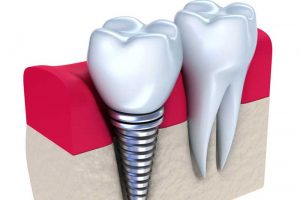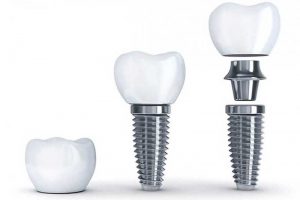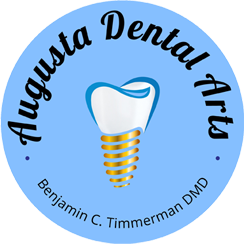Missing Teeth? You’re Not Alone!
Did you know that 69% of adults between the ages of 35-44 have lost one or more of their permanent teeth?
Receiving dental implants in the Augusta, GA area with Augusta Dental Arts is the ideal way to replace missing teeth today because they offer many benefits and freedoms that older tooth replacement appliances cannot.
The Benefits of Having a Dental Implant:


• Dental implants allow you to eat and speak without worry.
• A dental implant looks natural and flawless.
• Dental implants are designed to stop bone loss.
• Implants are convenient and easy – no slips, no noise, no messy paste to keep them in place.
• Implants increase confidence in your appearance.
Tooth replacement options have come a long way in recent years and for most patients, dental implants are the top choice over partial dentures and fixed bridges today. Dental implant procedures are favored because they do not elicit the complications that others can – in fact dental implants work to solve the problems and concerns that older appliances can cause.
A dental implant will not damage existing teeth in the way bridges can. Bridges work to fill in gaps, but the teeth they rely on for their anchoring require some reshaping and loss of enamel. Dental implants also prevent bone loss because, unlike dentures and bridges which sit on the gums, a dental implant works with the bone, keeping it as strong as a natural tooth root would. The titanium material from which implants are made is also resistant to decay and nonirritating to the body.
A dental implant looks most authentic, blending in seamlessly with the rest of your teeth. Patients with dental implants smile without embarrassment and are able to bite into food and speak freely without the fear of slips or noise, which are common complaints among patients who wear dentures. With proper care, such as regular brushing, flossing, and dental cleanings and checkups, your dental implant will last for many years!
Receiving dental implants in Augusta, GA with Augusta Dental Arts makes sense! Call our friendly team today to arrange a personal dental implant consultation for your missing teeth.
Mini Dental Implants: An Affordable, Minimally Invasive Implant Solution
Augusta Dental Arts now offers mini dental implants, a convenient alternative to traditional dental implants to replace missing teeth quickly. Mini dental implants function just like traditional implants except they are smaller and are suitable for patients with lower bone levels. The procedure for installing these implants is less invasive than traditional implants so patients enjoy faster results with minimal pain and discomfort. Some of the other benefits of mini dental implants include:
- Fast healing time
- Least healing time
- Requires fewer visits to the dentist
- Suitable for patients with less available bone
- Natural-looking results
- Saves bone and surrounding teeth
- Can be used in conjunction with crowns and bridges
- No need for dentures
- Permanent results
- Stops bone loss
Implant Supported Dentures Keep Your Dentures Secure and In Place
Permanent Dentures Improve Your Lifestyle. Implant supported dentures are snapped into place on top of dental implants. This provides a secure fit and hold, eliminating looseness or slipping without the need for paste or adhesives. Implant supported dentures are designed so that they can be removed for regular cleaning, or you can opt for fixed implant supported dentures, which function as permanent teeth.
Benefits of Implant Supported Dentures Include:
- Increased stability
- Ability to eat and speak with confidence
- No more discomfort
- Secure fit
- No embarrassing clicking sounds
Ball-Retained Dentures
Ball-retained dentures, also called stud-attached dentures, function with a ball and socket mechanism. The denture base has several sockets that line up with balls placed on dental implants in the jawbone. The balls and sockets fit together for an extremely secure fit, allowing for an open palate denture. Ball and socket attachment, is even less likely to slip or move, restoring the patient’s ability to eat and speak regularly.


